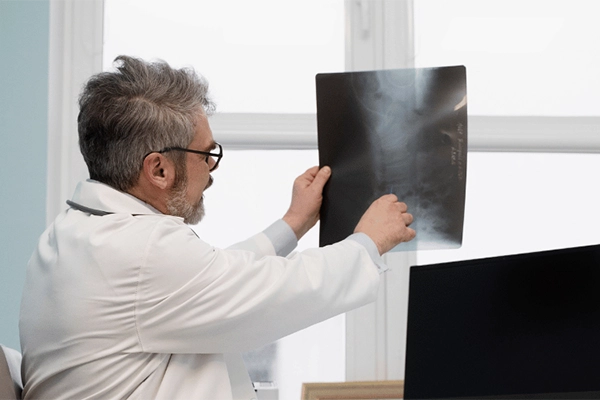Topics
Non-communicable diseases (NCDs) are a group of diseases that are not primarily caused by an acute infection. They have long-term health implications and frequently necessitate long-term treatment and care.
What are the types of non-communicable diseases (NCDs)?
There are four main types of NCDs:
- Cardiovascular diseases (conditions and diseases of the heart and blood vessels)
- Cancers
- Diabetes
- Chronic respiratory diseases
These four types of NCDs are responsible for approximately 71% of deaths worldwide. Low and middle-income countries such as Malaysia, Indonesia, and India account for 77% of all NCD deaths despite being preventable diseases.

According to the 2019 Global Health Estimates by World Health Organization (WHO), NCDs now account for seven of the top ten causes of mortality worldwide, with cardiovascular diseases being the leading cause of death for the last two decades.
- Cardiovascular diseases: 17.9 million individuals
- Cancers: 9.3 million individuals
- Respiratory diseases: 4.1 million individuals
- Diabetes: 1.5 million individuals
Malaysia is no exception when it comes to NCDs. The 2019 National Health and Morbidity Survey (NHMS) reported that 38.1% of the Malaysians have hypercholesterolaemia (high cholesterol levels), 18.3% have diabetes, and 30% have hypertension (high blood pressure).
The prevalence of obesity, overweight, and abdominal obesity is also on the rise, with 50.1% of Malaysian adults found to be obese or overweight.
Who are at risk of being affected by NCDs?
People of all age groups are at risk of being affected by NCDs although it is mostly seen in people between 30 to 69 years old.
Numerous changes in socioeconomic determinants of health, such as lifestyle changes, economic transition and sociodemographic shifts cause an increase in metabolic risk factors and high-risk behavioural changes that are mostly preventable.
People who smoke, lead a sedentary lifestyle, consume an unhealthy diet and alcohol are at higher risk of developing NCDs.
How do NCDs impact us?
Economic burdenThe ratio of Malaysians with risk factors remains significantly high, imposing an economic burden on our country.
As a result, the disease burden costs the nation approximately RM8.91 billion, or 0.65% of the national gross domestic product (GDP), based on a report by the Ministry of Health Malaysia (MOH) and WHO.
This not only burdens the country but also individuals as it affects their livelihoods and perpetuates poverty.
Overwhelming the healthcare systemFurthermore, the high prevalence of NCDs can overwhelm the healthcare system with a high volume of patients seeking care.
Over the last five decades, Malaysia has achieved significant strides in the development and delivery of its healthcare system.
However, there is tremendous pressure on our healthcare delivery systems to provide high-quality care to patients with NCDs and their diverse set of complications.
Lowering life qualityNCDs profoundly impact personal health by lowering their quality of life and their families. Certain diseases, such as cardiovascular disease, require more extended recovery period and rehabilitation process.
The emotional and financial toll can be devastating, setting you and your family back financially for years, particularly if you are unable to resume your full productive life before developing cardiovascular disease.
Hence, NCDs that are not well controlled will increase the number of individuals with disabilities who would not be able to lead a good quality of life.

What can you do to reduce the impact of NCDs?
Living in the pandemic has made it clear that NCDs can influence an individual's susceptibility to infection and pathogen performance.
Evidence shows that severe cases and deaths due to Covid-19 are closely linked with underlying NCDs and its associated risk factors. Hence, it is crucial that you take steps to protect yourself.
A critical component of preventing NCDs is addressing the risk factors linked with these diseases, and the key to this is lifestyle modifications. These modifications would also improve mental well-being and enhance immunity.
Invest in your health as early as possible to reduce the risk of developing NCDs, and that includes:
- A balanced and healthy diet
- Include plenty of fruits and vegetables.
- Take more protein and an adequate amount of complex carbohydrates (whole grains and beans).
- Reduce intake of salt to prevent an increase in blood pressure.
- Limit intake of sugar, saturated fats, and processed meat.
- Reduce alcohol consumption.
- Exercise or physical activity
- The best way to maintain a healthy weight is to combine good nutrition with regular exercise. Maintaining a healthy weight decreases your risk of developing hypertension.
- Exercise daily for at least 25-30 minutes.
- It can range from a brisk walk to moderate intensity activities.
- Regular exercise improves your cardiovascular system, decreases your cholesterol level, and maintains a healthy blood pressure level.
- Quit smoking
- One of the best things you can do for yourself is to stop smoking and the right time to quit is now!
- Smoking causes a wide range of health problems, including cancer, cardiovascular disease, and respiratory disease.
- Fortunately, the risk of developing NCDs reduce once you quit smoking.
- Manage stress
- Stress is inevitable but there are ways to handle it effectively.
- Consider using relaxation techniques and meditation to calm your mind.
- Practice mindfulness to reduce stress.
- Consult a professional if you require additional advice on ways to manage stress.
- Regular screenings
- Symptoms and severity of most NCDs are noticeable only at a later stage of life when it might be too late to treat.
- Regular screenings would keep your health in check and would be able to detect NCDs and its risk factors early, making them easier to manage.
Make an appointment for health screening at Pantai Hospitals
A large fraction of NCDs can be prevented by lifestyle modifications. Take charge of your health now!
It is important to go for regular health screenings if you are at risks of being affected by NCDs because it can help with early detection, and you can effectively manage your symptoms to avoid further complications.
To make an appointment for health screening, please contact the health screening centre at the Pantai Hospital nearest to you.
Pantai Hospitals have been accredited by the Malaysian Society for Quality in Health (MSQH) for its commitment to patient safety and service quality.
References
- World Health Organization. Non-communicable diseases. Available at https://www.who.int/news-room/fact-sheets/detail/noncommunicable-diseases [Accessed on 1 May 2022]
- NCDs – Non-communicable Diseases: Risk Factors and other Health Problems. Available at https://iku.moh.gov.my/images/IKU/Document/REPORT/NHMS2019/Report_NHMS2019-NCD_v2.pdf [Accessed on 1 May 2022]
- The impact of non-communicable disease and their risk factors on Malaysia's gross domestic product. Available at https://www.who.int/malaysia/news/detail/08-09-2020-cardiovascular-diseases-diabetes-and-cancer-cost-nearly-rm-9-billion-productivity-losses-annually-to-malaysian-economy [Accessed on 1 May 2022]
- Oxford Medicine Online. Prevention and control of non-communicable diseases. Available from at https://oxfordmedicine.com/view/10.1093/med/9780199661756.001.0001/med-9780199661756-chapter-237 [Accessed on 1 May 2022]













